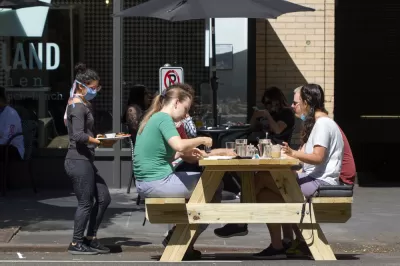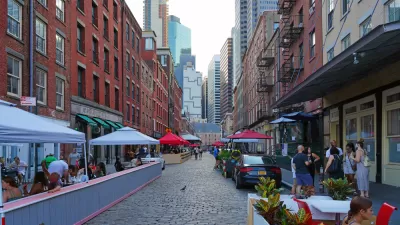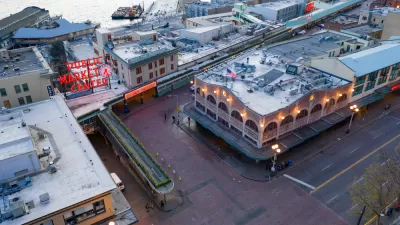It took a pandemic, but the worldwide effort to move restaurant and retail businesses outside, at the expense of parking, is proving far less controversial than it would have before the coronavirus swept the globe.

Something strange happened this summer, according to an article and radio broadcast for NPR by Camila Domonoske: the usual outrage when cities remove on-street parking in commercial areas hasn't materialized.
"Just ask Randy Rucker, the chef and owner of River Twice on East Passyunk Ave [in South Philly]. The restaurant placed tables in the street where as many as four cars used to squeeze in, in a neighborhood where every parking spot is prized."
The expected backlash never materialized. Rucker says it's been a positive experience.
Rucker is the owner of one of more than 400 businesses in Philadelphia to take advantage of the city's program to allow businesses to set up tables in parking lots—a program the city might extend throughout 2021. But cities all over the world are taking similar steps to lessen the footprint of cars in the public realm, with similarly less-than-controversial results.
So what explains the strange lack of controversy as businesses reclaim parking spots to operate during the pandemic? One explanation could be the lower traffic levels in general. "According to mapping company TomTom, Philadelphia's streets are about half as congested as they were pre-pandemic," writes Domonoske. Other sources confirm that vehicles miles traveled has plateaued below pre-pandemic levels in the United States.
"But even people who are driving and who still feel frustration over parking aren't protesting against the restaurant expansions," writes Domonoske. "One big reason why: They know the pandemic poses an existential threat to local restaurants."
For more on the planning and design specifics of "al fresco streets," see earlier coverage by Planetizen:
- Reopening Main Street (May 2020)
- Beyond Complete Streets: Could COVID-19 Help Transform Thoroughfares Into Places for People? (September 2020)
FULL STORY: Street Food: Cities Turn Parking Spaces Into Dining Spots And No One Seems To Mind

Study: Maui’s Plan to Convert Vacation Rentals to Long-Term Housing Could Cause Nearly $1 Billion Economic Loss
The plan would reduce visitor accommodation by 25,% resulting in 1,900 jobs lost.

North Texas Transit Leaders Tout Benefits of TOD for Growing Region
At a summit focused on transit-oriented development, policymakers discussed how North Texas’ expanded light rail system can serve as a tool for economic growth.

Using Old Oil and Gas Wells for Green Energy Storage
Penn State researchers have found that repurposing abandoned oil and gas wells for geothermal-assisted compressed-air energy storage can boost efficiency, reduce environmental risks, and support clean energy and job transitions.

Private Donations Propel Early Restoration of Palisades Playground
Los Angeles has secured over $1.3 million in private funding to restore the Pacific Palisades playground months ahead of schedule, creating a modern, accessible space that supports community healing after recent wildfires.

From Blight to Benefit: Early Results From California’s Equitable Cleanup Program
The Equitable Community Revitalization Grant (ECRG) program is reshaping brownfield redevelopment by prioritizing projects in low-income and environmental justice communities, emphasizing equity, transparency, and community benefits.

Planting Relief: Tackling Las Vegas Heat One Tree at a Time
Nevada Plants, a Las Vegas-based nonprofit, is combating the city’s extreme urban heat by giving away trees to residents in underserved neighborhoods, promoting shade, sustainability, and community health.
Urban Design for Planners 1: Software Tools
This six-course series explores essential urban design concepts using open source software and equips planners with the tools they need to participate fully in the urban design process.
Planning for Universal Design
Learn the tools for implementing Universal Design in planning regulations.
Ascent Environmental
Borough of Carlisle
Institute for Housing and Urban Development Studies (IHS)
City of Grandview
Harvard GSD Executive Education
Toledo-Lucas County Plan Commissions
Salt Lake City
NYU Wagner Graduate School of Public Service




























